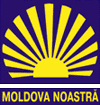
The Our Moldova Alliance was a social-liberal political party in Moldova led by Serafim Urechean, former mayor of Chișinău. It merged into the Liberal Democratic Party of Moldova (PLDM) during April 2011.

The European Social Democratic Party is a centre-left, populist social-democratic political party in Moldova. Established in 1997, the party holds pro-European views, and is an associate member of the Party of European Socialists (PES) and a full member of the Socialist International. According to its statute, the PSDE pleads that Moldova is an independent, sovereign, and democratic state, based on law, and integrated in the united family of European democracies. Reflecting former leader Marian Lupu's views, but also the strong influence of the Moldovan Orthodox Church, the party is more conservative on social issues, such as LGBT rights.
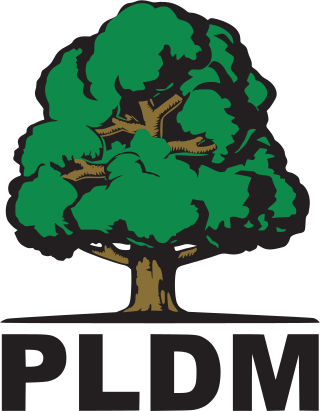
The Liberal Democratic Party of Moldova is a conservative political party in Moldova. The party is led by Tudor Deliu. Until 2016, PLDM was led by Vlad Filat, who was Prime Minister of Moldova from 2009 to 2013, in two cabinets. Immediately after the 2014 parliamentary elections, with 21 seats in the Moldovan Parliament, PLDM was the largest of the three democratic pro-European parliamentary parties.

Alexandru Oleinic is a Moldovan politician, who was elected as a deputy in the Parliament of the Republic of Moldova in two consecutive legislatures between 2001 and 2009, on the lists of the Electoral Bloc Democratic Moldova. Between 2009 and 2011 he was Minister of Information Technologies and Communications of the Republic of Moldova in the First Vlad Filat Cabinet.
Aurel Băieşu is a Moldovan jurist and politician, former deputy to the Parliament of the Republic of Moldova and deputy chairman of the Parliamentary Commission, Appointments and Immunities from August 2009 to December 2010.
Nicolae Misail is a Moldovan politician.
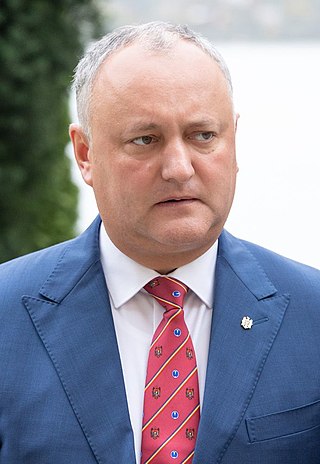
Igor Dodon is a Moldovan politician who served as the 5th president of Moldova from 2016 to 2020. He currently serves as the leader of the Party of Socialists of the Republic of Moldova since 2024. He served as Minister of Economy and Trade in the governments of Vasile Tarlev and Zinaida Greceanîi from September 2006 to September 2009 and was a member of the Parliament of Moldova from 2009 to 2016. He lost his bid for re-election in 2020 to Maia Sandu, whom he had defeated four years earlier in the 2016 Moldovan presidential election.
Events from the year 2012 in Moldova
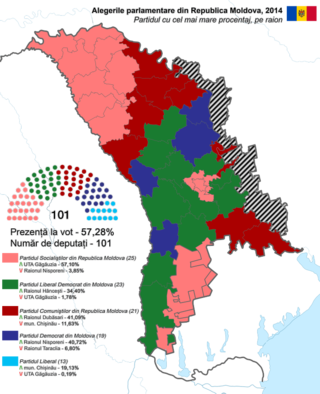
Parliamentary elections were held in Moldova on 30 November 2014. The result was described as "more a loss than a victory" of the incumbent pro-European coalition, with center-right parties divided by sharp tensions. The pro-Russian Party of Socialists (PSRM), composed of former communists, emerged as the largest party in Parliament, gaining 20.51% of votes and winning 25 of the 101 seats. The Party of Communists of the Republic of Moldova (PCRM), previously the largest party, dropped from 38 to 21 seats.

Iurie Muntean is a Moldovan politician, who served as a deputy Minister of Economy and Trade (2008–2009) and member of the Parliament of Moldova (2009–2014).

The Revival Party is a pro-Russian political party in Moldova.
Ion Dediu was a Moldovan biologist specialized in ecology, and a member of the CPSU, who was elected as a corresponding member of the Academy of Sciences of Moldova.

The Party of Action and Solidarity is a liberal political party in Moldova. The PAS was founded by Maia Sandu, the former Minister of Education and the incumbent president of Moldova. A pro-European party, it is an observer of the European People's Party (EPP) and the International Democracy Union (IDU).
Events in the year 2017 in Moldova.

Andrei Năstase is a Moldovan politician who served as Deputy Prime Minister and Minister of Internal Affairs from 8 June 2019 to 12 November 2019. He was also a member of Parliament of Moldova in 2019. Năstase was the leader of the Dignity and Truth Platform from 2015 to 2021.
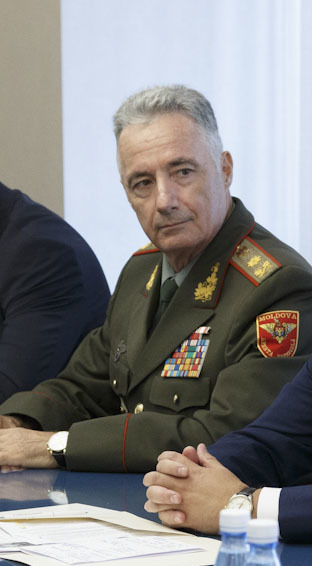
Victor Gaiciuc is a Moldovan military general, who served as Minister of Defense of Moldova from 2001 until 2004, 2019 until 2020 and 2020 until 2021. He was also the Defense and National Security Advisor to former president Igor Dodon. He is currently the chairman of the Union of Officers of Moldova and was also the secretary of the Supreme Security Council.

The Government House is a building in Chișinău of the Government of Moldova located on Great National Assembly Square and Stefan cel Mare Avenue. It was designed by Semyon Fridlin in 1964 on Victory Square and along Lenin Avenue. It used to be the headquarters of the Council of Ministers of the Moldovan SSR. The building is a 6-storey reinforced concrete structure, lined with white stone, made in the shape of a letter Russian letter П. Above the main entrance to the building is the inscription "The Government of the Republic of Moldova", as well as the coat of arms of Moldova and the flag of Moldova. In 2010, the Monument to the Victims of the Soviet Occupation was opened right in front of the building.

Ion Ceban is a Moldovan politician and the current mayor of Chișinău, Moldova's capital. He is also the leader of the pro-European National Alternative Movement party. Ceban was Vice President of the Parliament of Moldova in 2019 and has served as a member of parliament in three legislatures. From 2015 to 2019, he led his party's faction in the Chișinău Municipal Council. He has held different positions at the governmental level, ranging from department head to Deputy Minister.

The Anti-Aircraft Missile Regiment "Dimitrie Cantemir" is a aerial defense formation of the Moldovan Air Force, based in the village of Durlești. It has the mission to supervise and defend the airspace of the Republic of Moldova. Both conscripts and contract soldiers serve in the regiment. In addition, 35 women serving in its ranks.
Arina Spătaru is a Moldovan businesswoman and politician who served as a member of the Moldovan Parliament from 2019 and 2021.














